Verschwenden Spam-Nachrichten die Zeit Ihrer Agenten und lenken sie von Ihren Kunden ab? Spam-Management kann Ihnen helfen, die Unordnung zu beseitigen, damit Sie sich auf Ihre Kunden konzentrieren können. In diesem Artikel erfahren Sie, was Spam ist, wie er Unternehmen beeinflusst und welche Strategien zur Verwaltung von Spam über Instant Messaging bestehen.
Was ist Spam?
Spam bezieht sich auf unerwünschte Nachrichten, die über verschiedene Kommunikationskanäle gesendet werden. Es ist eine häufige Belästigung und kann in verschiedenen Formen auf verschiedenen Plattformen gefunden werden, einschließlich Instant Messenger wie WhatsApp, Viber und Telegram, E-Mail, Social Media, Blogs und Foren.
Diese Nachrichten enthalten alle Arten von Inhalt. Sie können in Form von Werbung für Produkte, Dienstleistungen oder Betrug kommen. Spam ist zwar ärgerlich, stellt aber auch ein ernstes Problem für Unternehmen dar, die sie erhalten. Was passiert, wenn Unternehmen keine Spam-Management-Strategien implementieren?
Wie wirkt sich Spam auf Unternehmen aus?
Spam betrifft alle. Tatsächlich ist etwa die Hälfte des E-Mail-Datenverkehrs Spam. Allein die hohe Anzahl an Nachrichten ist besorgniserregend, aber das Fehlen eines Spam-Managements wird andere Auswirkungen haben, die es auf Unternehmen hat.
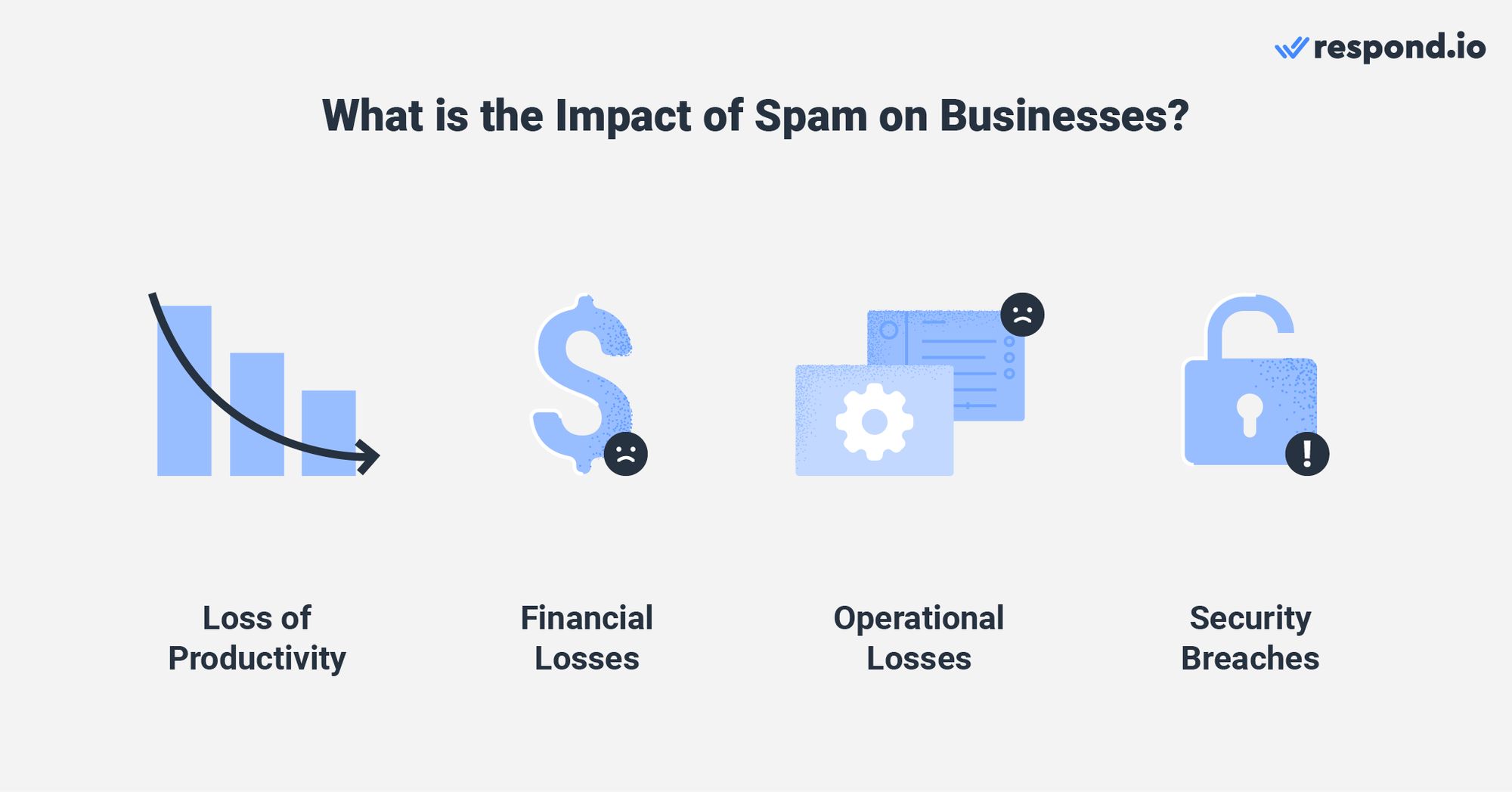
Sie kann die Produktivität behindern, zu verpassten Gelegenheiten führen, Operationen stören und die Datensicherheit gefährden. Lassen Sie uns diese Fragen näher beleuchten.
Spam over Instant Messaging: Verlust der Produktivität
Eines der Hauptthemen bei Spam-Nachrichten ist, dass sie wertvolle Zeit und Ressourcen verschwenden. Die Agenten müssen unerwünschte Nachrichten durchsehen, um legitime Nachrichten zu identifizieren und zu bearbeiten. Das ist zeitaufwändig und lenkt den Fokus von den Bedürfnissen der Kunden ab.
Darüber hinaus müssen Agenten möglicherweise zusätzliche Zeit aufwenden, um Spam-Nachrichten an ihre IT- oder Sicherheitsteams zu melden. Das Melden von Spam ist zwar für die Verbesserung der Filtersysteme von entscheidender Bedeutung, trägt aber zur Arbeitsbelastung bei und senkt damit die Gesamtproduktivität.
Spam over Instant Messaging: Finanzielle Verluste
Spam-Nachrichten können dazu führen, dass legitime Nachrichten von Kunden, Partnern oder anderen Stakeholdern leicht verloren gehen oder übersehen werden. Dies kann dazu führen, dass das Risiko verpasster Geschäftschancen oder wichtiger Informationen nicht umgehend angesprochen wird. Dies kann zu entgangenen Umsatz, verspäteten Projekten oder verpassten Terminen führen.
Zum Beispiel kann ein potenzieller Kunde's Anfrage oder ein zeitsensibler Vorschlag eines Partners fälschlicherweise als Spam eingestuft werden damit das Unternehmen die potenziellen Geschäfte verpasst.
Darüber hinaus kann Spam nachteilige Auswirkungen auf das Kundenengagement und die Kundenbindung haben. Wenn legitime Nachrichten von Kunden verloren gehen oder übersehen werden, kann es zu Verzögerungen oder gar keiner Antwort kommen. Dies kann zu einem Verlust im potenziellen Geschäft führen.
Spam over Instant Messaging: Operational Losses
Unternehmen riskieren eine Verlangsamung des Betriebs, wenn sie zu viel Spam erhalten. Nachrichten mit großen Anhängen oder Bildern können eine erhebliche Bandbreite verbrauchen. Je mehr das Volumen der eingehenden Nachrichten zunimmt, desto mehr wird das Netzwerk belastet, wodurch die verfügbare Bandbreite für legitime Geschäftskommunikation verringert wird.
Darüber hinaus kann eine große Menge an Spam, die den Server-Speicher belegt, den verfügbaren Speicherplatz für Kunden Nachrichten verringern, was zusätzliche Investitionen in die Speicherinfrastruktur erfordert.
Spam over Instant Messaging: Security Breaches
Spam-Nachrichten, die böswillige Links enthalten, können erhebliche Sicherheitsrisiken für Unternehmen darstellen. Diese Links können zu verschiedenen Sicherheitsvorfällen führen. Zwei gemeinsame Beispiele sind Phishing und die Verbreitung schädlicher Software.
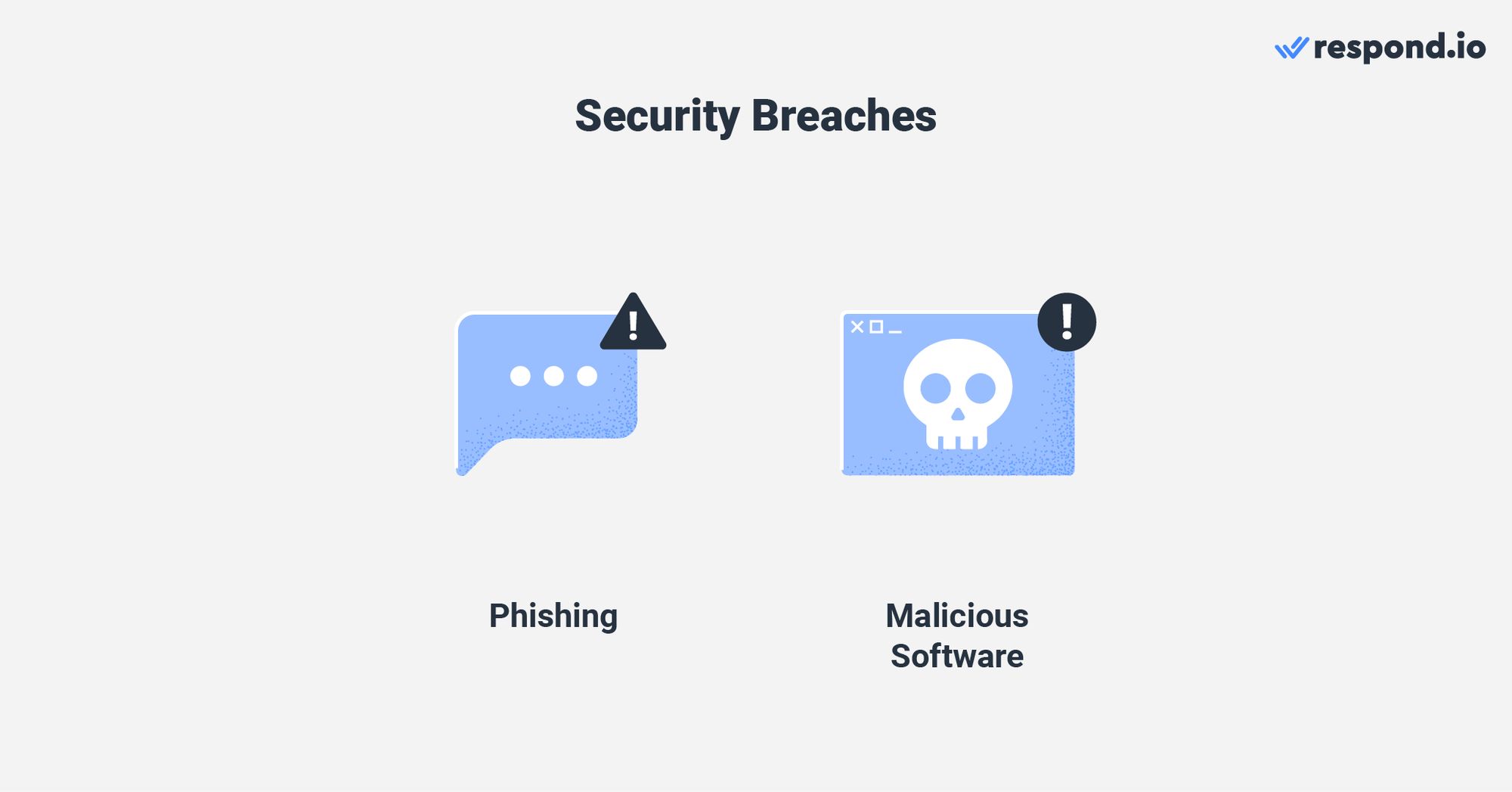
Phishing ist eine Technik, bei der Spammer betrügerische Nachrichten verschicken, die aus vertrauenswürdigen Quellen stammen, wie namhafte Unternehmen. Wenn Mitarbeiter auf diese Phishing-Versuche hereinfallen und unwissentlich sensible Informationen teilen, kann dies zu Datenverlusten und unberechtigtem Zugriff auf kritische Systeme führen.
Spam kann auch Links enthalten, die zum Download von schädlichen Dateien führen, wie Viren, Spyware, Ransomware oder Trojanern. Sobald sie auf einem Computer installiert sind, können sie verheerende Schäden anrichten, indem sie sensible Daten stehlen, Operationen stören oder Lösegeld verlangen.
Es ist klar, dass der Umgang mit Spam von entscheidender Bedeutung ist. Es spart Ihren Agenten wertvolle Zeit, indem es die Notwendigkeit reduziert, mit Spam-Nachrichten zu interagieren. Dies ermöglicht es ihnen, ihre allgemeine Reaktionsrate zu verbessern, da ihnen mehr Zeit zur Verfügung steht, sich auf legitime Anfragen zu konzentrieren. Erfahren Sie, wie Sie Spam-Management-Strategien im nächsten Abschnitt implementieren können.
Verwandle Kundengespräche in Geschäftswachstum mit respond.io. ✨
Verwalte Anrufe, Chats und E-Mails an einem Ort!
Spam-Management: 5 Strategien zur Verhinderung unerwünschter Nachrichten.
Gute Spam-Management-Strategien helfen Agenten, Spam zu identifizieren und zu behandeln, wodurch ihre Auswirkungen auf ihren Workflow reduziert werden. Aber um eines zu implementieren, brauchen Sie die richtigen Tools, um Ihnen zu helfen, wie respond.io.
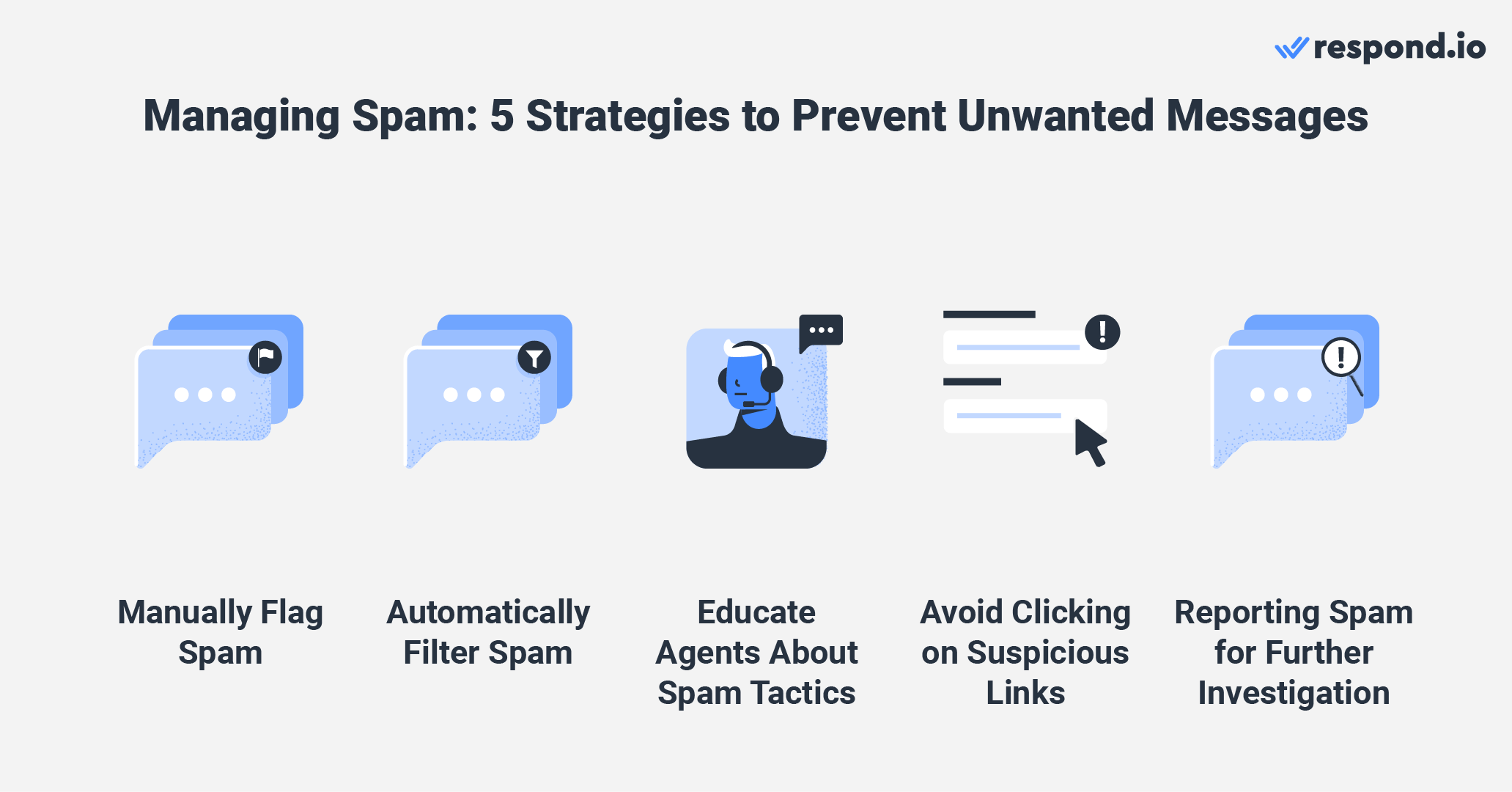
Respond.io ist eine Software zur Verwaltung von Kundengesprächen, die für eine große Anzahl von Kundengesprächen konzipiert ist. Es kombiniert Kommunikationskanäle wie E-Mail, WhatsApp und mehr in einen Omnichannel Posteingang.
Dies hilft Ihren Agenten Spam über alle Kanäle an einem Ort hinweg zu verwalten. Schauen wir uns nun einmal die besten Spam-Management-Strategien mit respond.io an.
Spam-Verwaltung: Spam manuell markieren
Wenn Sie zum ersten Mal eine Spammer-Nachricht erhalten, können Sie diese manuell in markieren, nur ein paar Klicks auf respond.io klicken. Das einzurichten ist einfach mit dem Markieren Kontakt als Spam Template im Modul zur Workflow-Automatisierung.
Hier ist ein Leitfaden zum Erstellen dieser Spam-Flagge-Taste.
1. Wählen Sie das Workflows Modul.
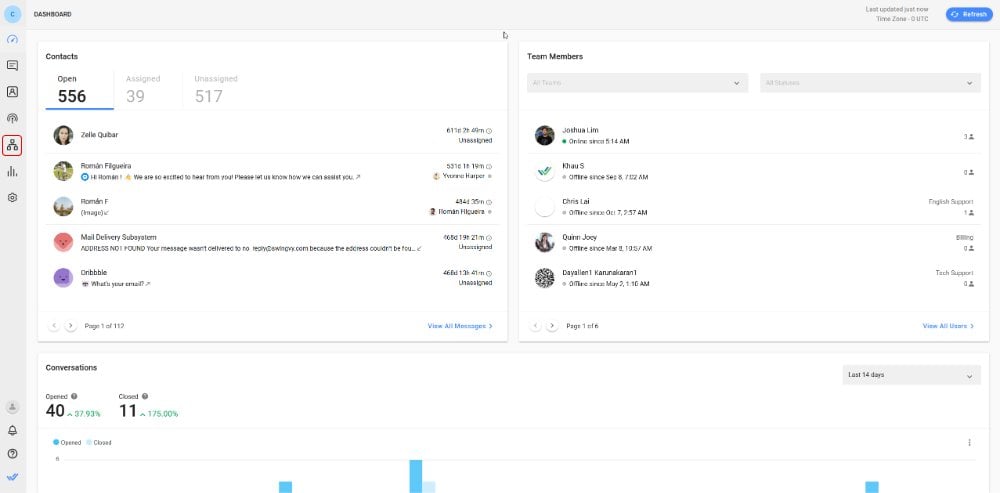
2. Klicke auf + Workflow hinzufügen
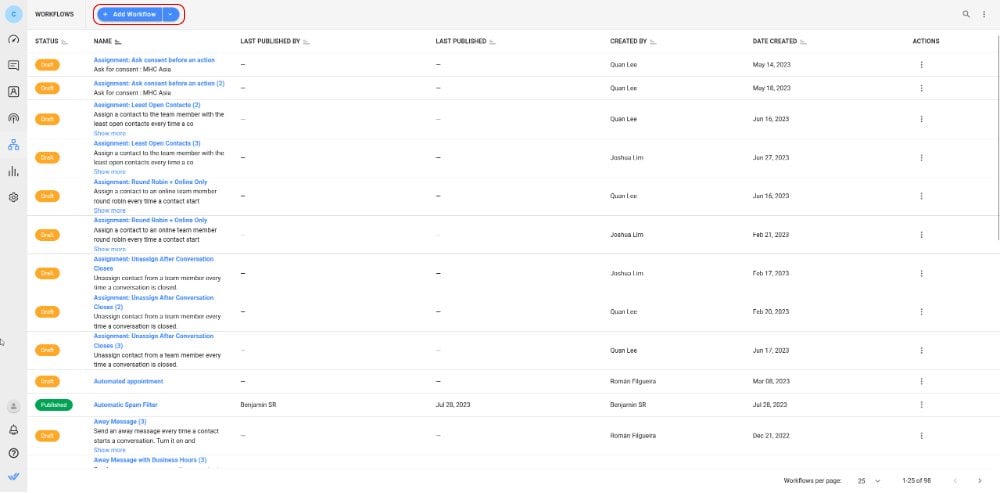
3. Wählen Sie Kontakt als Spam Vorlage markieren.
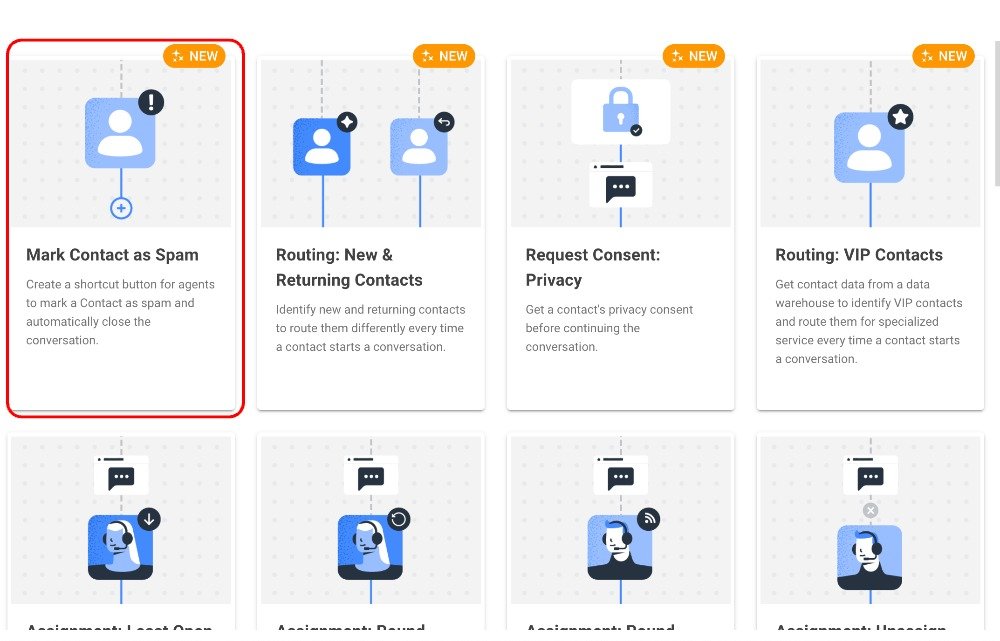
4. Klicke Vorlage verwenden.
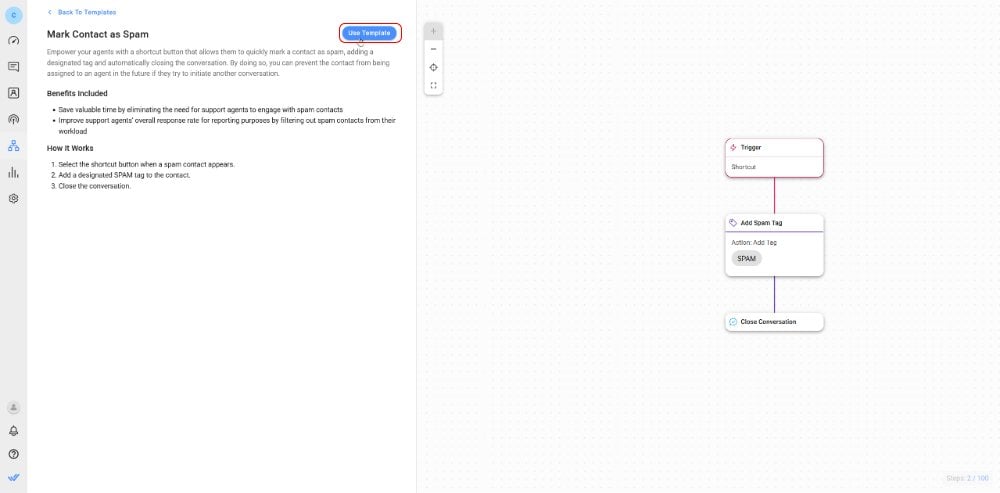
5. Wählen Sie Veröffentlichen.
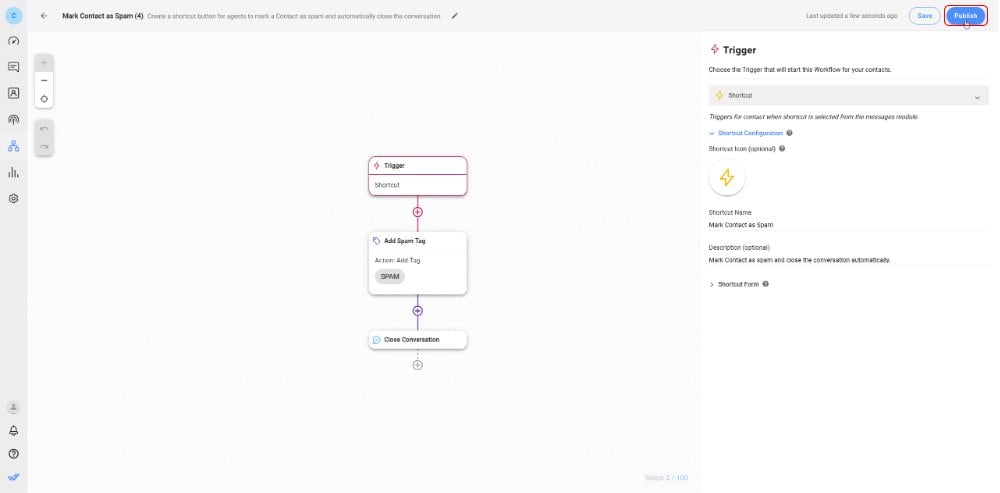
Du bist fertig. Sobald Sie einen Kontakt als Spam markiert haben, wird das Gespräch geschlossen.
Spam-Management: Spam automatisch filtern
Sie müssen nicht immer wiederkehrende Spam-Kontakte manuell kennzeichnen. Sobald ein Kontakt als Spammer identifiziert wurde, können Sie einen Spamfilter in jede Workflow-Chat-Automatisierung einfügen freischalten Agenten die Zeit, mit echten Kunden zusammenzuarbeiten.
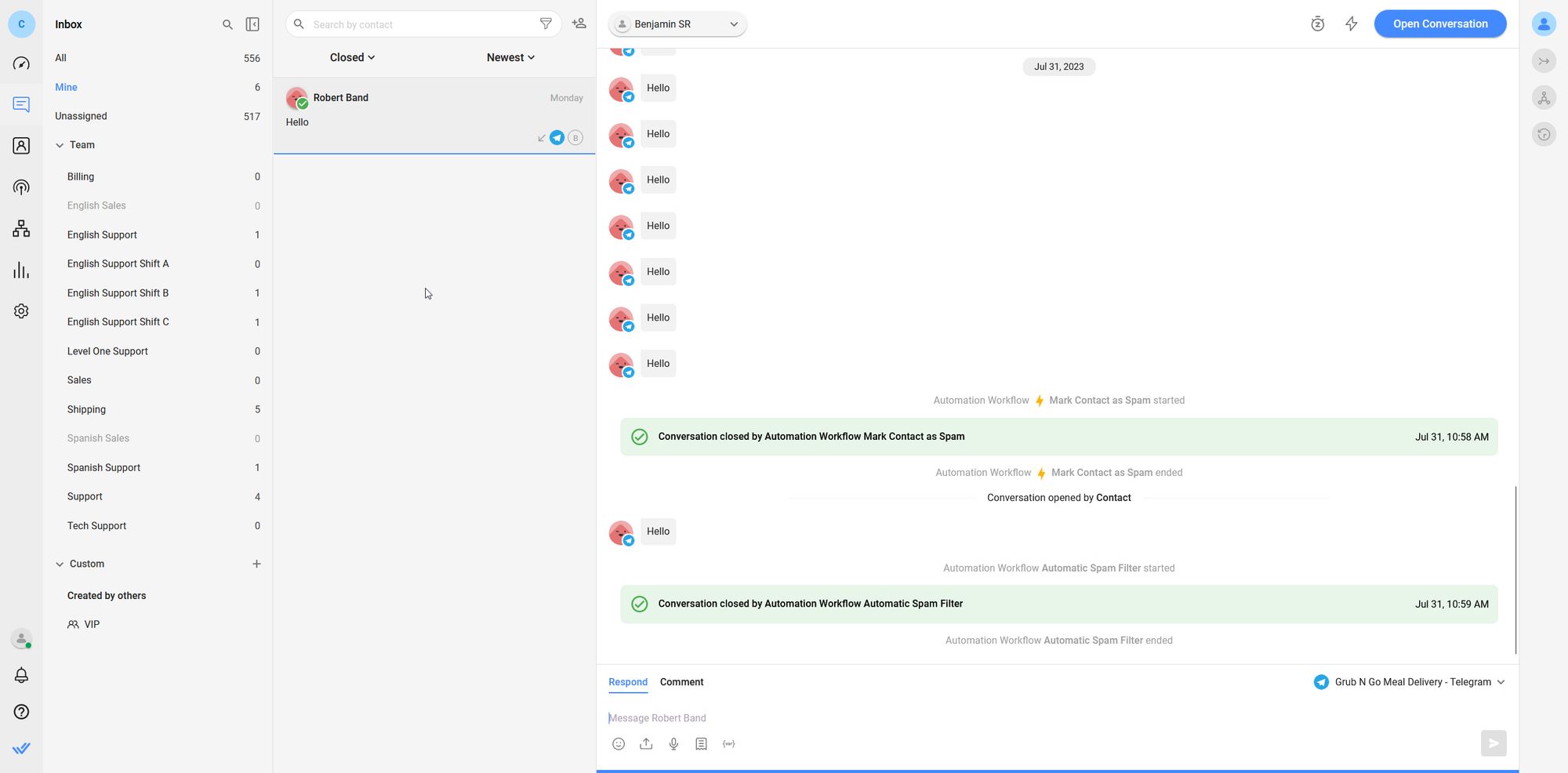
Sie können den automatischen Spamfilter durch einrichten, indem Sie einen Branchenschritt zu einem bestehenden oder neuen Workflow für eingehende Unterhaltungen hinzufügen.
Spam-Management: Agenten über Spam Taktik erziehen
Hilfe Agenten bleiben über allgemeine Spam-Taktiken informiert, um potenzielle Spam-Nachrichten zu erkennen und zu vermeiden. Indem Unternehmen den Agenten das notwendige Wissen und Bewusstsein zur Verfügung stellen, können sie das Risiko minimieren, Opfer von Spam-bezogenen Sicherheitsbedrohungen zu werden.
Einige Beispiele für Spam- oder verdächtige Nachrichten sind schlechte Schreibweise und Grammatik, Versprechungen unrealistischer Möglichkeiten und unerbetene Anhänge.
Spam-Verwaltung: Klicken Sie nicht auf verdächtige Links
Egal ob in E-Mails, Sofortnachrichten oder anderen Kommunikationskanälen, Agenten müssen vorsichtig sein, auf Links von unbekannten oder verdächtigen Absendern zu klicken. Dies dient dazu, sensible Informationen zu schützen und die Integrität Ihres Geräts und Ihres Netzwerks zu wahren. Diese Links können zu Websites oder Downloads führen, die die Sicherheit beeinträchtigen.
Üben Sie immer Wachsamkeit und überprüfen Sie die Legitimität von Verbindungen, bevor Sie mit ihnen interagieren. Die Vertreter sollten vorsichtig und proaktiv sein, wenn es darum geht, die Leitung des Teams oder die zuständigen Behörden über verdächtige Botschaften zu informieren.
Spam-Management: Spam für weitere Untersuchungen melden
Die Meldung von Spam für weitere Untersuchungen ist entscheidend, um eine große Anzahl von Spam-Konversationen effektiv zu erkennen und zu beheben. Agenten sollten ermutigt werden, Spam von mit dem Tag zu melden und eine Zusammenfassung der Unterhaltung mit Schließende Notizen, so dass Manager Spam-bezogene Probleme leicht erkennen und verfolgen können.
Sie geben wertvolle Einblicke in die Natur von Spam-Nachrichten und -Mustern, die die erste Filterung hätte umgehen können. Diese Informationen können verwendet werden, um weitere Untersuchungen durchzuführen, um die Taktik von Spammern zu verstehen.
Mit dem Know-how und den Werkzeugen zur Verwaltung von Spam können Sie die Zeit Ihrer Agenten freisetzen, um Kunden zu helfen, Verluste zu vermeiden und potenzielle Sicherheitsverletzungen zu verhindern. Bereit, den Umgang mit Ihren Kunden zu verbessern? Melden Sie sich für eine kostenlose respond.io Testversion heute an.
Verwandle Gespräche mit Kunden in Geschäftswachstum mit respond.io. ✨
Verwalte Anrufe, Chats und E-Mails an einem Ort!
Weiterführende Informationen.
Wenn Ihnen dieser Artikel gefällt, schauen Sie sich unsere Blogs zur Verwaltung von Kundengesprächen unten an:




































 Übersicht
Übersicht Elektronisch
Elektronisch Mode & Kleidung
Mode & Kleidung Möbel
Möbel Schmuck
Schmuck
 Außerschulische Aktivitäten
Außerschulische Aktivitäten Sport & Fitness
Sport & Fitness
 Schönheitszentrum
Schönheitszentrum Zahnklinik
Zahnklinik Medizinische Klinik
Medizinische Klinik
 Reinigungs- und Haushaltshilfen
Reinigungs- und Haushaltshilfen Fotografie & Videografie
Fotografie & Videografie
 Autoteile Einzelhändler
Autoteile Einzelhändler Autohändler
Autohändler
 Reisebüro & Reiseveranstalter
Reisebüro & Reiseveranstalter

![Spam-Management: Räumen Sie Ihren Posteingang auf [Aug 2023]](https://assets2-proxy.respond.io/ph8r57dk1q9w/28oVp2yxzo9Y0OMH0Oakvk/665e6a33a064d07d1841f66ba24241cb/concepts-spam-management-cover_7a69eae5b40655fb73d3f016b939055c.jpg?q=70&fm=avif)














